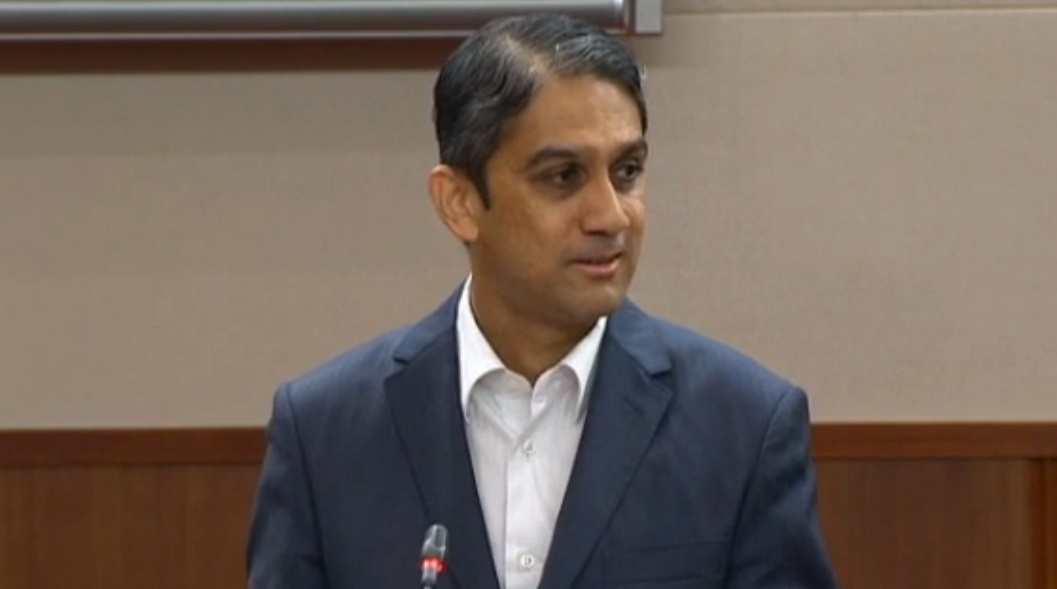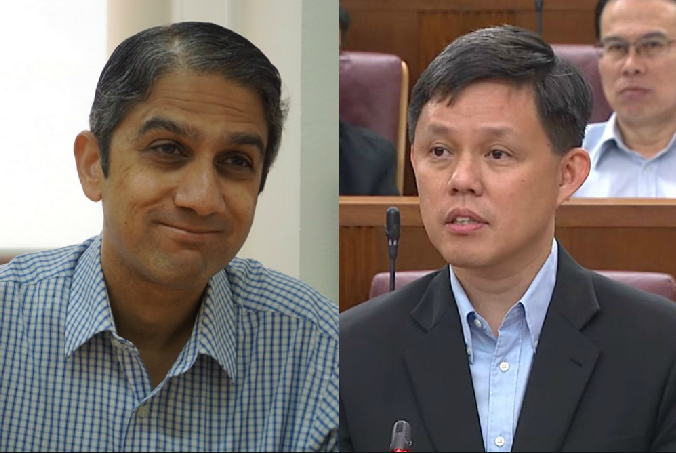What were you doing on Tuesday, February 28?
Chances are, it wasn't "tuning into the ongoing 2017 Budget debates in Parliament".
But fret not — we're here to share a speech that you are likely to have missed, but really shouldn't, made by this guy:

In case you too-successfully wiped the painful memories of GE2015 from your brain, this is Leon Perera, NCMP for East Coast GRC. Here's what he said in his speech on Tuesday, on the budget:
1. "Is what we are doing now delivering the results we need?"
Now, chances are, the whole CFE shindig might have made your eyes glaze over and compel you to ignore it completely. But it's important — underscored by the sheer number of heavyweight ministers on that committee, but also because that's the course Singapore is taking for our economy, which arguably drives many other things in our lives right now.
So Perera spent some time talking about it, while rattling off a series of stats:
- Our economic growth in the past two years was 2 per cent, the slowest since the financial crisis of 2009.
- For the first time since 2002, the number of job seekers in December 2016 outnumbered the number of jobs available.
- One city-level study cited by PM Lee in 2012 showed our GDP per capita doesn't rank among the top 20 worldwide. (and we know how much we hate not being number 1, much less in the top 20)
- The net births of companies (i.e. the number of companies that have been set up in Singapore, minus the number of companies in Singapore that have dissolved) has plunged last year to 6,000, from between 12,000 and 21,000 over the past four years.
To add on, Perera also mentioned our productivity levels, which we have repeatedly failed to revive even as the U.S., Korea, Hong Kong and Australia have become more productive.
Ouch.
2. "Is this a Budget that deals with the economic situation we are in?"
First, Perera introduced economics terms we have not had the chance to revisit since we returned our knowledge to our teachers at the A Levels. But basically:
Expansionary = increased government spending aimed at stimulating economic growth.
In this case, at the surface, our government's budget figures look absolutely expansionary, after all, we're operating at an S$8.2 billion deficit, which means, in simplistic explain-it-to-me-like-I'm-five lingo, we are spending that much more than we are going to receive in revenue for the year.
The thing is, though, Singapore is well-known for using a conservative method of accounting its budget. Folks like former GIC economist Yeoh Lam Keong have said this on multiple occasions, and Perera expressed this sentiment too:
"But what if we properly reflect the cash going out of the economy to the state in the form of land sales, projected to be $8.2 billion for 2017 net of other elements that may not be reflected such as the actual cash spending of endowments and funds? Once all these items are accounted for, is the Budget as expansionary as the basic deficit of $8.2 billion would suggest?"
Now, you might be thinking this is all rather "meh" to you. Who really cares about what's expansionary and whether we're in a surplus or deficit, and what Singapore counts into its budget?
Here's where Perera reaches his point:
"The recent Budgets from the PAP government have tended to follow a pattern – racking up a surplus in the early part of the Parliamentary term and then incurring deficit spending towards the end of the term close to the General Election. So much so that some economists now openly predict that Budgets in certain years will be election year Budgets that spend off the accumulated surpluses from the preceding term of Parliament.
Has the government held back on fiscal stimulus in 2017 so as to keep ammunition in reserve for closer to the election? And if so, is this the right thing to do for Singapore?"
And he beefs it with these observations:
1) In December last year, the URA and HDB raised carpark fees by 20 per cent.
2) In December last year, it was announced that electricity tariffs will go up from the start of this year.
3) Gas prices followed suit from February.
4) Service and conservancy charges at many PAP-run town councils were just announced to be going up from June this year.
5, 6) And during the budget, two key changes were announced — first, that a carbon tax will be imposed by 2019, as well as a "restructuring" of diesel taxes that links more strongly to the amount of diesel used.
7) The second, of course, being the one everyone knows about now: the 30 per cent water price hike.
Perera came right out to assert, in fact, that these measures announced between December last year and the end of February, were timed more to fit a political cycle, as opposed to an economic one.
"What is the justification for these price hikes and their timing? Hitting the economy with these multiple price hikes within the space of a few months may make good political sense, because people have three years to forget them before the next General Election.
But do they make good economic sense?
Why introduce all these price hikes now at a time of economic fragility, when they could tip some SMEs at the margins over the edge, when they increase the hardships faced by Singaporeans beset by job market insecurities? Why not introduce some of them later when there is an upswing in external demand?"
Now, backing him up, was fellow East Coast NCMP Daniel Goh, who calls this a "wait and see" Budget.
He highlighted a psychological insecurity many Singaporeans have that is not helped by the price hikes.
He raised, among others, the issue of the water price hike:
"The 30 per cent hike in water price and the carbon tax when implemented will have knock-on effects on the costs of living, as all areas of everyday life are affected by the use of water and electricity.
Middle-income households do not have the benefit of the enhanced financial transfers to low-income households to soften the impact of the water price increase. Compared to low-income and high-income households, middle income Singaporeans will feel the head-on impact of the increase in costs of living most strongly."
He ended his speech with an interesting nugget:
"...when it gets dark and cold in the field, being present on the lines with the troops and not hiding out in a warm tent is a tremendous demonstration to our people that they are being fully supported and truly valued. It is not my place to lecture the government leaders on what they should be doing to be present on the lines with the workers and small businesses. But it is my duty to register that there is a need for it."
Now on Wednesday, Minister in the Prime Minister's Office and Labour Chief Chan Chun Sing took to the podium in the debate to respond to some of the points raised by Perera and Goh.

According to a Channel NewsAsia report of his comments, he vigorously defended the government's position in ahem, spending less during this election half-time period.
Here are his key points:
1. We're not spending now because we must earn our keep first.
“Some say this is a political Budget; that we spend less so we can time the political cycle. Guess what … At the start of every term of Government, PAP (People’s Action Party) or otherwise … We precisely designed the system such that no government will come in and promise to spend before it has earned its keep.
This is unlike other countries. This is the reason why we have been able to get one dollar out of every five to support our Budget. So we rather err on the side of caution. This is why our forefathers have put in this system and this generation will continue to uphold this system.”
2. He disagreed that the government has not come up with short-term measures to help Singaporeans and Singapore businesses.
“Is that so? If this is so, why did (Finance) Minister Heng Swee Keat announce targeted measures to help specific sectors like offshore and marine? Like the S$700 million we pushed into the construction sector? If this is so, why spend all that we spent for that increase in U-Save rebates, to make sure that even though prices may increase on average, we will take care of the lower-income first?
If we adopt such a cynical attitude to budgeting, would we have done this? If indeed this is a cynical Government, then we shouldn’t be giving anything at all.
No, this is not a cynical Government and it would be wrong for us to impute our own perverse motives. (The Budget) is targeted to help, and precisely because we feel the pain for our people.”
3. A "Responsible Government"
Chan also added that the government's priority is on both addressing short-term pains and establishing conditions for long-term success.
“One (government) that not only takes care of short-term needs of the people, but also the future. One that prices essentials properly and does not distort the market, leading to more subsidies that will burden future generations.
A responsible Government is not one that will raise prices and not take especially greater care for the poor. It is not one that pretends it will make difficult decisions but no one will have to bear a greater part of the responsibility to help those with less.
A responsible Government is someone who knows what is not sustainable, and will put a stop to it now.
This is not a ‘wait-and-see’ Budget. If this is a ‘wait-and-see’ Budget, we wouldn’t have to put in place mechanisms for carbon pricing, or talk about diesel taxes or water taxes. If this is a political Budget, we don’t have to talk about any of those.”
We'll leave you to decide what to make of all this; we just wanted to tell you about these speeches and points that were made about all the costs that have gone up or will be going up in the very near future, even as we head into economic uncertainty, in the middle of Singapore's election cycle.
Top photo collage: Jonathan Lim, screenshot from Parliament video
If you like what you read, follow us on Facebook and Twitter to get the latest updates.
If you like what you read, follow us on Facebook, Instagram, Twitter and Telegram to get the latest updates.
